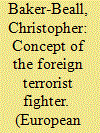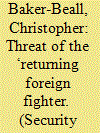| Srl | Item |
| 1 |
ID:
190899


|
|
|
|
|
| Summary/Abstract |
The conflicts in Iraq and Syria have led to concerns in the West over ‘foreign fighters’. Although states are anxious about the role these individuals play in the conflicts they join, their primary concern relates to the perceived ‘terrorist’ threat they pose on their return. This fear has led to an evolution in the international policymaking arena, with foreign fighters now often referred to as ‘foreign terrorist fighters’ (FTFs). A Critical Theory-inspired immanent critique is offered to highlight various problems that exist with the FTF term and to argue policymakers should resist its use. The article demonstrates the importance of language by showing how the invocation of the FTF threat has strengthened the ongoing development of globally coordinated counterterrorism action. Specifically, it argues UN Security Council Resolution 2178, agreed in 2014, generates a legal obligation upon UN member states to implement new counterterrorism laws at national level to combat the perceived threat from FTFs. The article highlights the negative effect these laws have on human rights. It is argued institutions like the UN need to ensure new counterterrorism legal instruments are built from a human rights rather than security-first perspective if commitments to human rights in transnational counterterrorism are to be fully realised.
|
|
|
|
|
|
|
|
|
|
|
|
|
|
|
|
| 2 |
ID:
170619


|
|
|
|
|
| Summary/Abstract |
The ‘Foreign Terrorist Fighter (FTF)’ phenomenon in contemporary time has got prominence since the inception of the Syrian Civil War in 2011. Thousands of different nationals especially from European countries travelled or made efforts to travel in war-torn Iraq and Syria to fight for the terrorist groups, predominantly the Islamic State (IS/Da’esh). It is argued that a bulk of the FTFs might have gone back to the countries of origin or home countries after the substantial loss of IS territory/Caliphate in Syria. The concern regarding the returnee FTFs assumed high priority on the political agenda of many Western countries for about last half a decade and stressed on a broad array of policies and strategies: policy on prevention of radicalization; information sharing and intelligence exchange; responses to returnees with criminal justice trial; deradicalization, rehabilitation, and reintegration with the mainstream population. However, the ‘Global Village’ is not immune from the menace and spillover effects of FTFs and the returnees. Thus, the present paper makes an effort to trace the universal response strategies against FTFs and the returnees including the associated families. It attempts to answer some fundamental questions, i.e., who are the foreign terrorist fighters? why do they go to foreign land to fight? and what are they likely to do when the fight is over? It furthermore examines how some of the affected countries have responded to the menace of FTFs and the returnees. The paper also argues that global communities are facing formidable challenges to counter the terrorist activities of FTFs and the returnees. Thus, there is a need to have a comprehensive approach to eliminate the risks eminating from contemporary FTF phenomenon.
|
|
|
|
|
|
|
|
|
|
|
|
|
|
|
|
| 3 |
ID:
168494


|
|
|
|
|
| Summary/Abstract |
This article analyses the European Union’s response to the threat of the ‘returning foreign fighter’ (referred to with increasing frequency as the ‘foreign terrorist fighter’), arguing that it has been characterized by a move to (re)frame migration and border control as essential aspects of EU counter-terrorism policy. The article offers three important observations on the significance of this move. First, it critiques the way in which the EU’s response to this problem is based upon and reinforces a narrow understanding of returning foreign fighters. Second, it argues that the EU has invoked the threat from returning foreign fighters not with the sole intention of preventing terrorism but rather as part of the ongoing securitization of migration and the EU border. Third, it suggests that the threat from returning foreign fighters has been invoked as a way of further legitimizing the EU’s emerging role as a security actor and its embrace of preemptive security practice. The article argues throughout that the move to construct the returning foreign fighter issue in this way has important political and social implications for all categories of migrant, with migrant populations now deemed a potential source of terrorist threat.
|
|
|
|
|
|
|
|
|
|
|
|
|
|
|
|